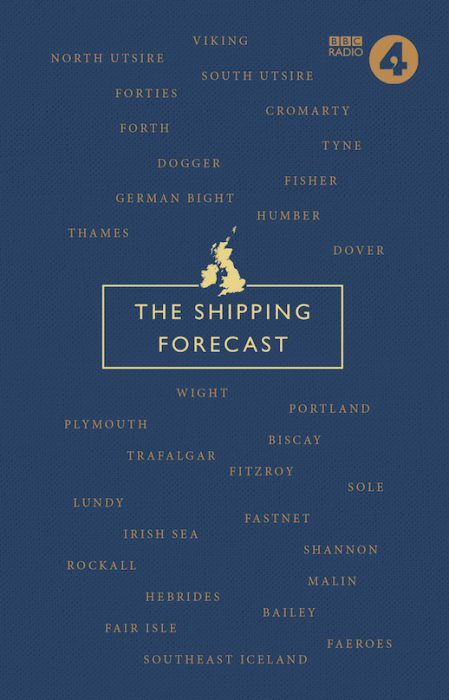An extract from the introduction to The Shipping Forecast by Nic Compton
(BBC Books, 216 pages, hardback. Out now and available here in the Caught by the River shop, priced £9.99.)
Camariñas, Spain, July 2000. I am stormbound in northern Spain on an old wooden sloop I bought in southern Portugal and am sailing back to the UK. Before setting off, some friends and I spent a week patching the boat up, but despite our best efforts we weren’t able to cure a persistent leak in the garboards and, after bashing through a gale in the Trafalgar sea area, the mast has developed an ominous crack. Chastened, we listen to the Shipping Forecast with renewed zeal. As we head north into Finisterre (now FitzRoy), we hear a disembodied voice on the radio say: ‘Finisterre: Northwesterly 6 or 7, occasionally gale 8 later. Fair. Good.’ That’s just too much weather for this old girl, and we take shelter in a small harbour just north of Cape Finisterre.
BBC Broadcasting House, London, December 2015. ‘Now the Shipping Forecast issued by the Met Office on behalf of the Maritime and Coastguard Agency, at 00:15. There are warnings of gales in all areas except Biscay … ’ I’m listening to the Shipping Forecast again, but this time the voice isn’t disembodied at all but coming from the man seated right in front of me, speaking into a large microphone. Senior announcer Chris Aldridge is surrounded by five computer screens, four clocks and several keyboards; Newsnight is on a TV screen overhead, and Today in Parliament is playing on the radio. But Chris is oblivious to it all. He’s rehearsing the 00:48 Shipping Forecast, marking his place on the (paper) script every 30 seconds to make sure he keeps within his ten-minute allocation. Chris is one of the longest-serving announcers at the BBC. He’s been reading the Shipping Forecast for the past 20 years and reckons he has probably recited it about 3,000 times. He has a deep respect for everything it represents, though it’s not the most exciting part of his job. ‘It’s one of the least creative things we do, as it’s just reading from a script,’ he says, ‘but it’s the thing people always remember. As soon as I say I read the Shipping Forecast, a light goes on in people’s faces.’
So why is the Shipping Forecast so popular? ‘It’s something that defines us as an island nation,’ says Chris. ‘A lot of the names are unfamiliar to people apart from the context of the Shipping Forecast, so it turns our landscape into a slightly ethereal world, inhabited by communities we are connected to but know nothing about. It’s something that binds us together when so much divides us. I feel chastened on nights like this when I see storm force 11, and think there are people out there contending with that weather, putting their lives at risk in pursuit of their livelihood – be it in the navy, on fishing boats or just lone travellers.’
At 00:48 exactly, Chris cues ‘Sailing By’, the iconic piece of music that introduces the late-night Shipping Forecast, and also acts as a convenient buffer should the previous programme overrun. Then he launches into the forecast itself, this time for real. His reading is word-perfect, without the slightest hesitation, despite his having a sore throat. As he reads, he glances up at the clock continually and places his finger over what he’s just read to make sure he doesn’t repeat anything. His voice is calm and deliberate, with just a hint of concern when he gets to ‘violent storm 11’. At 12:59 exactly, he wishes the listeners a ‘peaceful night’ and, with 50 seconds to go, cues in the National Anthem. Job done.
Having been at both ends of the Shipping Forecast now, I’m still in awe of this 95-year-old institution that seems immune to the vagaries of time. I’ve listened to it at sea to make what are potentially life and death decisions, but I’ve also listened to it while on land and been comforted by its slow but determined circumnavigation of the British Isles. As a former seafaring nation that has turned its back on the sea, it awakens our DNA and reminds us of our not so distant (and not always proud) maritime heritage. Or perhaps it’s an echo of our Christian past, when for centuries the Bible was read in Latin and brought comfort to worshippers even though they didn’t understand a word of it. Certainly no one who has young children can be in any doubt about the hypnotic power of repetition, be it in books or TV programmes. But above all, the Shipping Forecast has a utilitarian poetry, both in the beauty of its pared-back language and in its unique rhythms – where else could you hear the word ‘good’ imbued with so much meaning and dignity?
